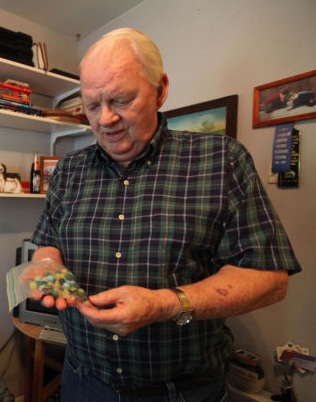Has Grandpa Lost His Marbles Or Am I Losing Mine?
Published: Fri, 02/28/14
|
|
|
 | |
|
Ask the Expert: Your Elder Law Questions Answered by Evan H. Farr, CELA |
|
Has Grandpa Lost His Marbles Or Am I Losing Mine?
If you cannot view the image below, please read the article on our blog.
 Q. My father, Jim, has been a big help to our family. He picks up our daughter, Sophie, from preschool every day and watches her while my husband and I are working, which we are very grateful for. Lately, however, he has been forgetting a lot of important things. Last week, he forgot to take Sophie's lunch from the refrigerator and she ended up not having a lunch to eat at school after I reminded him three times. A couple of days ago, he went to pick Sophie up at school when I was supposed to do so, and I was upset when I saw my daughter wasn't there at pick-up and ready for her doctor's appointment. He even once sent her to school with tights and a top and forgot to put on her skirt. I was mortified when the teacher called me at work. I have also noticed things have changed when I talk to him. He forgets a lot of names of things and important details. I once brought it up with him and he insisted that he was okay, and changed the subject. My mother, Joan, acknowledges that he also has been forgetting to pay bills lately, but is convinced that forgetting things is a normal part of aging and that maybe he isn't getting enough sleep. I wish that I could get them both on board with my concerns about dad, if they are indeed valid. Again, we are so appreciative for all the help, and I know that he loves his granddaughter, but I am concerned for my father and for Sophie in his care. Am I right to be concerned? If so, how do I broach this difficult topic with him and my mother again without hurting his feelings or facing his denial and refusal to get checked out by a doctor? Also, from a legal perspective, what do we do if we find out that he is in the early stages of Alzheimer's or another form of dementia? A. Five million Americans have Alzheimer's disease, with a new diagnosis being made every seventy-two seconds, with millions more at risk. Although experts agree that early diagnosis and treatment are essential, some people with memory loss, such as your father, often don't think that there is a problem and are unwilling to get screened. One of the hardest conversations an adult child can have with an aging parent is about their concerns regarding their aging parents' health, safety and/or finances. Because of the difficulty of such topics, many families don't have the conversation until it is too late. Whether it's caring for your daughter or forgetting to pay the bills, making mistakes while doing something one has done for many years is alarming, and you have a right to be concerned. However, it sounds like getting your father to the doctor might be tricky, and getting your mother on board may be a challenge, as well. Below are some suggestions for when you do attempt to have the conversation once again with your family:
Once your family is agreeable, a good evaluation from a trusted doctor will give your family some answers about your father. Please read our blog post about the SAGE Test, a test that your father can complete at home and bring to his primary care doctor, who will determine if further evaluation is needed. Once you are at the physician's office, be sure to stay with your dad (and mom, if she comes too) for the examination. That way you can hear the doctor's recommendations and get a first-hand report. If you stay in the waiting room, your dad may come out and report that all is well! He may not have understood the doctor's message or have forgotten key parts of the conversation. Hopefully the physician will discover a reversible issue, such as a B-12 deficiency, a medication issue, or depression, and not dementia! The Alzheimer's Association has many suggestions about how to prepare for the evaluation and how to get the most out of your time with the doctor or evaluation team. You'll be surprised by the number of successful but quite different approaches families use to insure timely evaluation of changes in memory and thinking. When it comes to legal planning, if your father is diagnosed with Alzheimer's or another dementia, creating a plan for your father's future in the early stage of the disease can be empowering and can ensure that his wishes are met. The sooner he establishes his legal plans, the better prepared your family will be. Our firm, the Fairfax and Fredericksburg Elder Law Firm of Evan H. Farr, P.C. (www.VirginiaElderLaw.com) is dedicated to helping protect seniors and individuals with Alzheimer's and other types of dementia by preserving dignity, quality of life, and financial security. With proper planning, when the time comes for your father to enter a nursing home, your family can retain all of the assets and most or all of the income while Medicaid takes care of the nursing home. Proper planning also helps to ensure that your mother will be able to maintain her dignity and standard of living. Read more about the services we offer to help families in similar situations, then call us at 703-691-1888 in Fairfax or 540-479-1435 in Fredericksburg to make an appointment for an introductory consultation. ------
 Can Mom Be Discharged from a Nursing Home Against Her Wishes?
 Dear Commander Bun Bun, My mother, Bunny, was told she is being discharged from the nursing home in which she resides. She and I are completely against this. For what reasons may a nursing home discharge a resident and what recourse do we have? Hop you can help! Ariel Hassle ------- Dear Ariel, First of all, anyone named "Bunny" is good by me! Nursing homes are required to follow certain procedures before discharging a resident, but a facility may occasionally attempt to discharge an undesirable resident by transferring the resident to a hospital and then refusing to let him or her back in. This practice is called "patient dumping" and, in most cases, is illegal. The Nursing Home Reform Act of 1987, however, prohibits transfer or discharge of a resident by a skilled nursing facility, except for the following reasons:
Before transferring a resident, the facility must inform the resident about its bed-hold policy, and the resident (or someone on behalf of the resident) must typically pay privately to hold the bed. If the resident is a Medicaid recipient, the nursing home must readmit the resident to the first available bed if the bed-hold period has passed. Residents or their families or the attorney for the resident (such as our firm) can appeal or file a complaint with the state if a nursing home refuses to readmit them. Also, please read 20 Common Nursing Home Problems--and How to Resolve, a helpful publication from the National Senior Citizen's Law Center. Good luck,
Cmdr. Bun Bun About Commander Bun Bun Commander Bun Bun is a year-old Holland Lop rabbit that belongs to Grace Everitt, one of our Asset Protection Paralegals at the Farr Law Firm. In the past, Grace used to raise rabbits for pets and show in Florida, and Commander Bun Bun was the runt of her last litter. As a baby, Commander Bun Bun's mother accidentally bit off her tail and then stopped feeding her. After being hand-reared by Grace, she is now a completely happy and healthy little bunny. Commander Bun Bun loves to be held like a baby and to have her tummy rubbed. You can often find her resting under Gracie's printer table. She enjoys all of the attention (and, of course treats) she gets from staff and friendly clients at the firm. We encourage you to visit us and meet her and our other extraordinary critters! |
|







